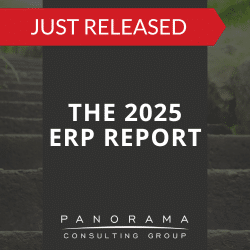A successful ERP implementation can improve organizational efficiencies, reduce manual errors, and streamline operations. Arguably nowhere are these features more important than in the public sector.
While the right ERP vendor can ensure your project goes off without a hitch, the opposite can also be true. Today, we’re sharing five signs that could indicate your government ERP implementation is falling victim to ERP vendors who are misrepresenting themselves. By staying aware, you can spot these signs early and avoid having to file an ERP lawsuit.
The Public Sector Faces Many Challenges
There are many reasons why government organizations are turning to ERP systems. These public sector organizations face myriad business challenges that ERP software is specifically designed to resolve:
- Network and data security concerns
- Complicated procurement and bidding processes
- Staffing shortages
- Tightening budget constraints
While ERP solutions can help government entities address the above concerns, the road to implementing new technology is often rocky. For too many companies, setbacks can occur that threaten to undermine their project:
- Projects running over projected timelines
- Cost overruns
- Inability to realize expected benefits
Many of the problems above can be traced back to the very beginning – the ERP selection phase. Sometimes, during this process, vendors will misrepresent their software or their implementation methodology in an attempt to win your business.
A Failed Payroll System Implementation
Panorama’s Expert Witness team was retained to provide a forensic analysis and written report to the court regarding the failed implementation of a major software developer’s ERP/payroll system.
5 Signs of ERP Vendor Misrepresentation in Government ERP Implementations
Below are a few signs of ERP vendor misrepresentation to look out for, especially in the public sector. If you can spot these signs early, you can ensure your government ERP implementation doesn’t succumb to the devastating consequences of vendor misrepresentation.
1. Overstating the Software’s Ability to Support Each of Your Functional and Technical Requirements
In this case, if something sounds too good to be true, it’s time to do your research. Be wary of any vendor who automatically guarantees that their proposed software will be able to handle all your intricate, day-to-day tasks without taking the time to understand your unique needs.
The reality is that public sector organizations often follow complicated, detailed procedures to ensure compliance with regulatory mandates and protect their constituents. An off-the-shelf ERP solution may not provide the full functionality required, and any vendor who promises otherwise could be purposely overstating the platform’s abilities just to get in the door.
2. Underestimating the Cost and Time to Implement the Software
Another common sign of vendor misrepresentation is underestimating project costs and project duration. The reasons are simple: Vendors know that time and money are essential assets to all organizations. If they can appeal to your bottom line and promise a sooner go-live than their competitor, they believe they can win the work, no questions asked.
How do you know if the vendor is underestimating? Seek input from an ERP implementation consultant. These experts are often experienced in the business aspects of ERP and understand that success requires a focus on more than just technical aspects. For example, they will likely recommend a more robust organizational change management approach than your vendor is proposing.
3. Oversimplifying the Software’s Ability to Create and Modify Governmental Reports
As mentioned, government processes can be complex and highly specialized in nature. These processes are often managed by lock-tight controls that ensure only authorized users can manipulate them.
One of the selling points of conventional ERP systems is that approved team members across departments have access to a variety of organizational files, which they can create and modify as needed. However, public sector ERP systems are designed to be more controlled in nature.
To this end, your system may require customization to enable certain reporting functions. This isn’t usually a quick or inexpensive process, though an unscrupulous vendor might sell you the idea that it can be.
4. Overstating the Governmental Experience and Qualifications of their Implementation Consultants
Not every vendor will have experience and expertise in the public sector space, but it’s worth your time to find a team that does. You need a company that is well-versed in the pain points and challenges faced by organizations like yours, not one that has strictly worked in the commercial and private sector space.
We recommend asking each prospective team member to share their unique qualifications and their past performance in the government services realm before moving forward.
5. Understating the Amount of Software Customization Required
Out-of-the-box ERP software is less expensive and easier to implement than a customized solution. If you’re at the helm of small, private business, an out-of-the-box system may provide all the functionality you require.
However, most government organizations will require sophisticated systems with specialized controls that out-of-the-box solutions cannot provide. If a vendor understates the amount of customization you might need, consider this a major red flag. Your vendor should be upfront about customization, the costs you can expect and how it will affect your timeline.
A Partner Who Knows the Public Sector
While a government ERP implementation comes with certain risks, new technology can transform your organization and help you serve your employees and constituents better than before.
However, you can’t get there alone. An ERP consultant who uses a team-based approach can lead you through these next steps, ensuring that your vendor sets realistic expectations.
Our ERP experts have helped public sector organizations like yours select technology that aligns with their current and future needs. Request a free consultation below to learn more.













